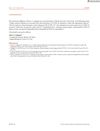 6 citations,
October 2020 in “medRxiv (Cold Spring Harbor Laboratory)”
6 citations,
October 2020 in “medRxiv (Cold Spring Harbor Laboratory)” Early treatment improved COVID-19 outcomes, and spironolactone helped reduce risks in females with high androgen levels.
 41 citations,
February 2021 in “Cureus”
41 citations,
February 2021 in “Cureus” Proxalutamide helps COVID-19 patients get rid of the virus faster and recover quicker.
 6 citations,
December 2023 in “Lancet. Infectious diseases/The Lancet. Infectious diseases”
6 citations,
December 2023 in “Lancet. Infectious diseases/The Lancet. Infectious diseases” SIM01 significantly reduced post-COVID symptoms and is safe.
 3 citations,
August 2021 in “Clinical, Cosmetic and Investigational Dermatology”
3 citations,
August 2021 in “Clinical, Cosmetic and Investigational Dermatology” Teledermatology was popular among young adults and women, and high-resolution photos improved service during the pandemic.
 November 2021 in “World Family Medicine Journal /Middle East Journal of Family Medicine”
November 2021 in “World Family Medicine Journal /Middle East Journal of Family Medicine” Third booster shots enhance the immune system's response to the COVID-19 virus.
 August 2021 in “Journal of skin and stem cell”
August 2021 in “Journal of skin and stem cell” Skin symptoms could help in early COVID-19 diagnosis but more research is needed to confirm their reliability.
 42 citations,
July 2021 in “Frontiers in Medicine”
42 citations,
July 2021 in “Frontiers in Medicine” Proxalutamide significantly lowered hospital admissions for male COVID-19 patients compared to a placebo.
May 2023 in “Clinical and translational neuroscience” Tailored neurorehabilitation programs improve life quality for post-COVID-19 patients.
 November 2021 in “Journal of the European Academy of Dermatology and Venereology”
November 2021 in “Journal of the European Academy of Dermatology and Venereology” 2021 saw a slow return to normalcy and increased scientific engagement despite COVID-19 challenges.
 123 citations,
May 2020 in “Drug Development Research”
123 citations,
May 2020 in “Drug Development Research” Men's sensitivity to male hormones might affect how severe COVID-19 gets for them.
 4 citations,
June 2022 in “BioMed Research International”
4 citations,
June 2022 in “BioMed Research International” Using mesenchymal stem cells or their exosomes is safe for COVID-19 patients and helps improve lung healing and oxygen levels.
 1 citations,
February 2023 in “JMIR. Journal of medical internet research/Journal of medical internet research”
1 citations,
February 2023 in “JMIR. Journal of medical internet research/Journal of medical internet research” Social media data can help track COVID-19 symptoms and predict the pandemic's status.
 1 citations,
January 2022 in “Turkiye Klinikleri Journal of Dermatology”
1 citations,
January 2022 in “Turkiye Klinikleri Journal of Dermatology” Lifestyle changes during the early COVID-19 outbreak led to more cases of acne and other skin conditions, but fewer cases of rosacea and skin infections.
 September 2022 in “Research, Society and Development”
September 2022 in “Research, Society and Development” Long-lasting symptoms like fatigue and breathlessness can persist after COVID-19, requiring ongoing medical follow-up.
20 citations,
March 2022 in “Journal of clinical medicine” Nearly half of the studied men with long COVID had low testosterone, including younger men.
 13 citations,
July 2020 in “bioRxiv (Cold Spring Harbor Laboratory)”
13 citations,
July 2020 in “bioRxiv (Cold Spring Harbor Laboratory)” Four drugs were found that could potentially treat COVID-19 by inhibiting the virus in lab tests.
 5 citations,
May 2020 in “Dermatologic Therapy”
5 citations,
May 2020 in “Dermatologic Therapy” 5-alpha reductase inhibitors might worsen lung recovery in COVID-19 patients, suggesting a pause in their use.
June 2020 in “Faculty Opinions – Post-Publication Peer Review of the Biomedical Literature”  5 citations,
December 2022 in “Annals Academy of Medicine Singapore”
5 citations,
December 2022 in “Annals Academy of Medicine Singapore” Some skin medications can have harmful interactions with the COVID-19 drug nirmatrelvir-ritonavir, but not with molnupiravir.
4 citations,
June 2022 in “Journal of food bioactives” Eating plant-based anti-inflammatories and antioxidants may help manage long-term COVID-19 health issues.
 June 2023 in “BMC Pharmacology and Toxicology”
June 2023 in “BMC Pharmacology and Toxicology” The trial will test if proxalutamide is safe and effective in reducing death in severe COVID-19 patients.
 2 citations,
October 2022 in “Current Dermatology Reports”
2 citations,
October 2022 in “Current Dermatology Reports” People on immune-modifying skin disease treatments may have a weaker antibody response to COVID-19 vaccines but often improve after the second dose.
January 2024 in “Ageing & longevity” Good nutrition and essential trace elements like zinc, selenium, and iron are important for a strong immune system and reducing COVID-19 severity.
 January 2023 in “Sibirskij medicinskij vestnik”
January 2023 in “Sibirskij medicinskij vestnik” Women with PCOS are more vulnerable to severe COVID-19 and related health issues.
 1 citations,
June 2021 in “Cureus”
1 citations,
June 2021 in “Cureus” A girl with hereditary chorea, likely Huntington's disease, had her condition worsened by lupus.
 1 citations,
May 2021 in “International Journal Of Medical Science And Clinical Invention”
1 citations,
May 2021 in “International Journal Of Medical Science And Clinical Invention” Women with PCOS may have a higher risk of severe COVID-19 due to hormonal imbalances and vitamin D deficiency.
 1 citations,
April 2022 in “Rheumatology”
1 citations,
April 2022 in “Rheumatology” A man developed autoimmune symptoms after the Pfizer COVID-19 vaccine, highlighting the need for thorough vaccine safety checks.
 April 2021 in “Journal of the European Academy of Dermatology and Venereology”
April 2021 in “Journal of the European Academy of Dermatology and Venereology” The document corrects an author's affiliation in previous articles about COVID-19 and its links to hair loss and hormones.
 50 citations,
July 2021 in “Nature Communications”
50 citations,
July 2021 in “Nature Communications” The drug enzalutamide may reduce the ability of the virus causing COVID-19 to enter lung cells.
 February 2024 in “Curēus”
February 2024 in “Curēus” Long COVID is more common in those with severe initial infections, but not linked to blood group.
























